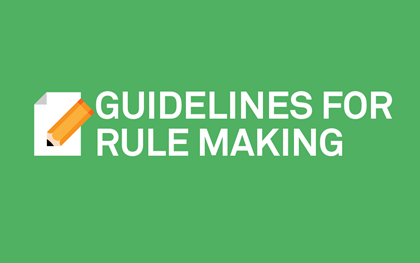
They say that good fences make good neighbors. HOA rules can work the same way – putting the right parameters in place can help keep everyone happy. Too few rules result in anarchy, and too many rules start to feel onerous to residents. This is where you, as an
HOA board member, come in. It’s usually the role of the HOA board to create the rules and your property management company is there to help in
enforcing HOA rules. Striking the right balance in your rule making will protect the value of your community, while fostering a feeling of goodwill among residents. Here are some guidelines to help you do that.
Creating and enforcing HOA rules
-
Follow common sense when you’re making rules.
Create rules only if it’s absolutely necessary, and base them on the right authority within the community. Be careful that your rule doesn’t unreasonably limit the activities of residents; try to balance protecting freedom with protecting home values and resident safety.
-
Keep it simple.
Rules should be clear and easy to follow. Compliance should never be hard, and residents should have the ability to comply and to meet the standards of all rules.
-
Communicate the rules.
This is especially important with new rules...make people aware of the rule so they can adapt to them. This communication should begin beforehand, so you can build consensus for the rule.
-
Review the rules.
Examine the rules regularly to make sure they still make sense and apply to the current environment. If not, eliminate them or update them so they remain relevant.
-
Be consistent.
Arbitrary application of a rule is a surefire way to encourage residents to disregard it. If there’s a rule, it applies to everyone...most of the time (see item 6, below).
-
Allow exceptions, when reasonable.
No rule can apply to every situation. Be judicious when you are enforcing HOA rules in your community, and make sure you’ve been lenient when the situation dictates it.
-
If a rule is broken, act swiftly – but fairly.
Give the resident who has broken the rule proper notice of his or her action or behavior, along with a clear description of the consequences. After that, listen openly to the resident’s side of the story. Remember, your residents have the right to legal counsel should they feel they are being penalized unfairly. Also, keep in mind that your homeowner association (HOA) management company is there to help with enforcing HOA rules the right way.
-
Be results-oriented.
Every rule should achieve something, so it should be designed with a specific goal or outcome in mind. Remember this and you’ll avoid arbitrary rules and those that are the result of political pressure.
-
Avoid extremes.
Resist the temptation to institute draconian, knee-jerk rules when there’s a problem. Always try to understand that each situation is unique and requires perspective when creating rules for it. By the same token, don’t inflict heavy penalties for minor infractions. And always be open to making exceptions should the situation warrant it.
-
Ignore anonymous.
If you get complaints that come from unverified sources or from a source that refuses to be named, don’t act on it. A credible complaint will come from a person who is willing to stand behind it.
-
A rule should be a solution, not another problem.
Sometimes the cure is worse than the illness. If your rule creates a bigger mess than what you started with, then it’s not a good rule.
Rules should work for, not against, your association. Remember these tips and you’ll find that good rules enhance a community, not limit it. For more on creating and enforcing HOA rules,
contact FirstService Residential, North America’s leading association management company.
 They say that good fences make good neighbors. HOA rules can work the same way – putting the right parameters in place can help keep everyone happy. Too few rules result in anarchy, and too many rules start to feel onerous to residents. This is where you, as an HOA board member, come in. It’s usually the role of the HOA board to create the rules and your property management company is there to help in enforcing HOA rules. Striking the right balance in your rule making will protect the value of your community, while fostering a feeling of goodwill among residents. Here are some guidelines to help you do that.
They say that good fences make good neighbors. HOA rules can work the same way – putting the right parameters in place can help keep everyone happy. Too few rules result in anarchy, and too many rules start to feel onerous to residents. This is where you, as an HOA board member, come in. It’s usually the role of the HOA board to create the rules and your property management company is there to help in enforcing HOA rules. Striking the right balance in your rule making will protect the value of your community, while fostering a feeling of goodwill among residents. Here are some guidelines to help you do that.